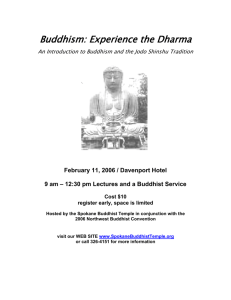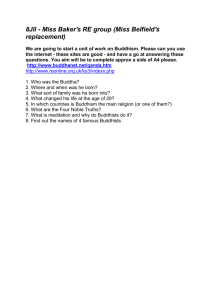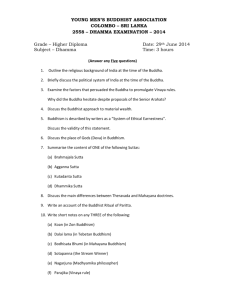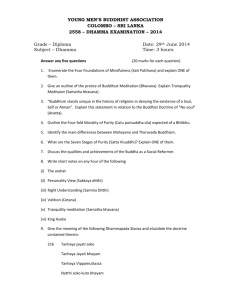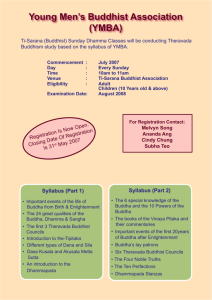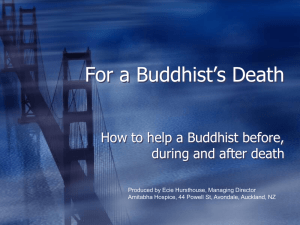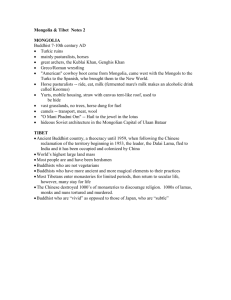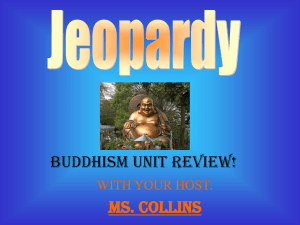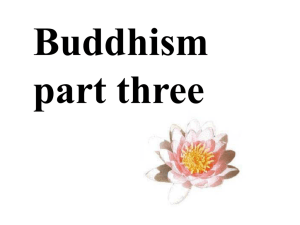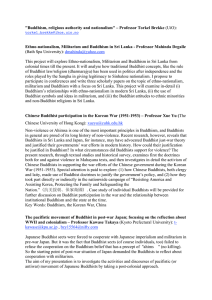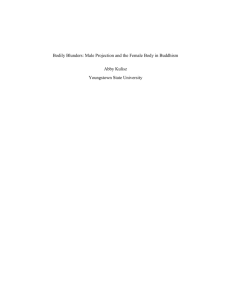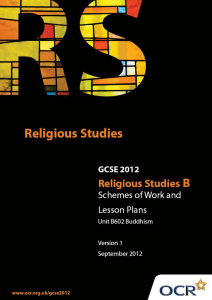Let Us Crush the Forces of Evil by Being Adequately Buddhist
advertisement
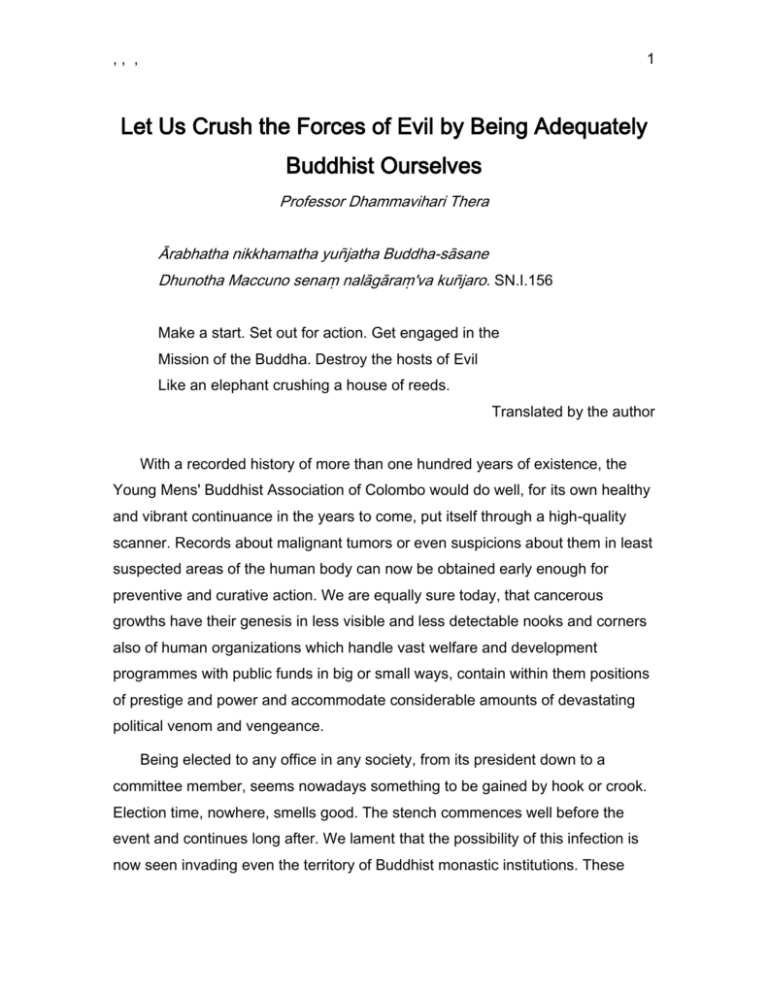
1 ,, , Let Us Crush the Forces of Evil by Being Adequately Buddhist Ourselves Professor Dhammavihari Thera Ārabhatha nikkhamatha yuñjatha Buddha-sāsane Dhunotha Maccuno senaṃ nalāgāraṃ'va kuñjaro. SN.I.156 Make a start. Set out for action. Get engaged in the Mission of the Buddha. Destroy the hosts of Evil Like an elephant crushing a house of reeds. Translated by the author With a recorded history of more than one hundred years of existence, the Young Mens' Buddhist Association of Colombo would do well, for its own healthy and vibrant continuance in the years to come, put itself through a high-quality scanner. Records about malignant tumors or even suspicions about them in least suspected areas of the human body can now be obtained early enough for preventive and curative action. We are equally sure today, that cancerous growths have their genesis in less visible and less detectable nooks and corners also of human organizations which handle vast welfare and development programmes with public funds in big or small ways, contain within them positions of prestige and power and accommodate considerable amounts of devastating political venom and vengeance. Being elected to any office in any society, from its president down to a committee member, seems nowadays something to be gained by hook or crook. Election time, nowhere, smells good. The stench commences well before the event and continues long after. We lament that the possibility of this infection is now seen invading even the territory of Buddhist monastic institutions. These 2 ,, , societies of men and women, declared to be organised for the welfare of the Sāsana [Sāsana-sevaka and Sāsanārakṣaka etc.], whither are they now heading? Buddhists, laymen and laywomen, beware ! We need a consensus of opinion as to what the concept Buddha Sāsana stands for. Not to get together and buy more and more land, as is clearly evident, to build palatial residences here and there for these Sāsana saviours. In Sri Lanka today, irrespective of age and learning, many a Buddhist monk in diverse stations in society becomes pre-eminent overnight within their own circles, and interprets even the injunctions of Pansil or pañcasīla in their own fanciful ways. Let not Sri Lankans, Buddhist or non-Buddhist turn a deaf ear to what is being said about items like pāṇātipātā, kāmesu micchācārā and surāmeraya-majja- pamādaṭṭhānā though our own over-glorified media today. The stanza from the Samyutta Nikaya quoted above insists on the need to crush and shatter the forces of evil in the world: dhunotha maccuno senaṃ [= Crush the forces of the Evil One.]. But remember, Buddhist or non-Buddhist, whoever wishes to undertake to do this, should adequately arm himself first. He should correctly understand what evil in the world means. In Sri Lanka today, nay the world over, evil is now seen sprouting with vigor, unheard of before, and thriving thereafter luxuriantly. Proneness of man for cheap sources of joy, for gluttonous feeding in the realm of consumerism and their allied super market eating and drinking, or insatiable greed for sexual gratification, fanned and inflamed through diverse media tactics, underlie this menacing tornado. Supporting this and underlying this as a solid bedrock is the current globally spiraling notion of selfhood or self-gratification and self-elevation. This menace is both individual and collective. The resulting total disregard for the other in our midst, his comfort and his well-being, is being pumped in daily into the human mind via religion, ethnicity and political indoctrination. This is clearly more devastating than the death-dealing viruses like aids, known to the medical world today. Nobody anywhere, political leaders of the world or parents in the home, ever dare raise a finger for their arrest or elimination. Legitimacy of 3 ,, , this unbridled patterns of behavior or their misanthropy, is nobody's concern today, internationally or globally. Lying beneath this thirst for pleasure or sensory gratification [kāma taṇhā], like a snake under grass, and stimulating it, are the gold seekers of the commercially wise business world who seduce, tempt and entice the average worldly being, man, woman and child with all manner of ingeniously produced items to possess and consume, more often for its own pleasure of possession than consumption. For the consumer, it is primarily the joy of being in the rat race. These middle men are plagued with the collectors' greed to swell their over balancing financial abundance than serving anybody's real needs. Like in politics, here too, the majority with greater gullibility are sacrificed for the gain and glory of an ingeniously clever few. Buddhist teachings view these diverse aspects of the world of pleasure with clarity and make decisive judgements with conviction. ` Those who have ears to hear, let them pay adequate attention ': ye sotavanto pamuñcantu saddham. Those who are guided by the dhamma never fall by the wayside and get plunged in woeful states of suffering, here or hereafter: na duggatiṃ gacchati dhammacārī. Dhamma is full of guidance with regard to the gratification of senses. Buddhism never denies the pleasures the senses provide. They are relatively valued and are said to be bringing in their wake massive loads of pain and discomfort, compared with the minimal pleasures they entice you with. For the benefit of the larger corpus of the world, the dhamma is taught at different levels of relevance. But they are all integrated to serve the one single purpose of liberation from the ills of the living process called Samsāra. They all converge in the bliss of release in Nirvana. This is called the shift from the worldly or mundane [lokiya] to the transcendental [lokuttara]. Dhamma-living at all stages, early or late, brings happiness to mannkind: dhammo suciṇṇo sukhaṃ āvahāti. The liberation process in Buddhism is worked out through three gradual 4 ,, , stages of culture in the life of man and is known as sikkhā. To begin with, man of the world needs to be harmoniously fitted into the complex into which he is born to live, with humans, animals and plants therein. This vision already contains the modern magnanimous scientific concepts like biota and ecosystems. Buddhists do not believe in a system of creation, with priorities for any single product as man against woman, or some human groups over others in terms of caste as Brahmins above Kṣatriyas in India. Not even of subordination of animals for human consumption under divine sanctions. Today it is a source of global delight that this latter is now breaking down, under an emerging new vision with a commendable degree of sanity in the western world which generated and upheld this heretical belief. The first in this three-fold culture of Buddhism with which alone we shall deal here is sīla which is set up to regulate and build up the moral goodness of man, without any divine commands, guaranteeing his inter-personal relationships with one another. The basic sīla begins with a minimum of five injunctions [pañca- sīla], primarily covering the areas of security of life [pāṇātipātā veramaṇī], ownership of possessions [adinnādānā veramaṇī] and propriety of gender relations [kāmesu micchācārā veramaṇī]. It took the world, the United Nations, two and a half millennia to sense the need of these for the wellbeing of mankind. To this are also added two more items, of honesty in all social transactions [musāvādā veramaṇī] and the need to safeguard one's sanity of judgement by keeping away from drugs and intoxicants [surāmeraya-majja-pamādaṭṭhānā veramaṇī]. The first of these injunctions requires that we do not destroy life of any living thing. No matter for whatever reason. Nor should we in any way condone or connive with destruction of life in any form anywhere [Pāṇaṃ na hane na ca ghātayeyya na cā'nujaññā hanataṃ paresaṃ Sn. v. 394] This awareness of compassion as the ultimate ethic or ahiṃsā paramo dharmah was introduced into the world by the Jainas even before the Buddha. Buddhists, more than twentyfive centuries ago, shared this ethic of respect for all forms of life with the Jains of 5 ,, , the day. Highlighting this theme, an American lady by the name of Victoria Moran brought out a publication entitled Compassion The Ultimate Ethic [1981-83], stressing the role of Jainism and Buddhism towards this cause. Up to 1997 this book has run into five editions. The enlightened world of today, from Australia to the U.S.A., with personalities like Professor Peter Singer, Jeremy Rifkin and Frances M. Lappe, and many others with commendable sanity, now respectfully accept this position. This now is the direction in which the world is moving. In the light of all these trends, we search in vain for the sanity and wisdom of Buddhists of Sri Lanka, both monks and lay persons who keep groping in the dark, looking for prohibitions by the Buddha against eating animal foods, meat and fish etc., or insisting on propriety of sexual behaviour. While our preachers crow in this manner from roof-tops, we comfort our selves in the belief that they know not what they say. However, a lamentably vast majority of Sri Lankans today suffer from severe stupefaction in the area of religion, with very little hope of preventive or curative care coming from any quarter. We pray that a kingdom of man, heedless of all religious dogmatism, shall soon be established on earth here, in the territory of man, so that he may live happily and die in peace, without any disrespect for any form of life. Let no religion admit killers, of humans or of animals, into a kingdom of God which claims to have even a shade of divine sanctity.
